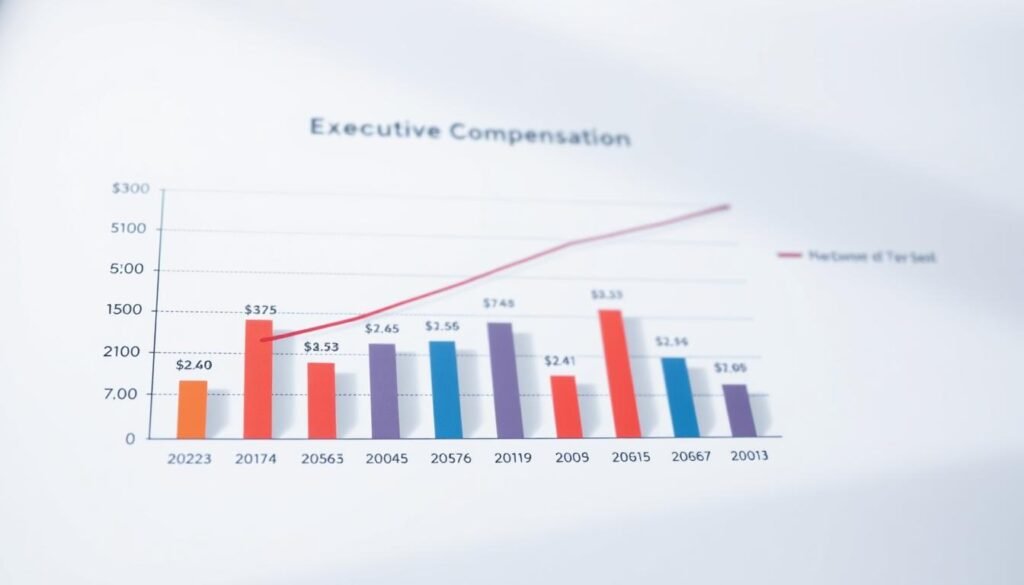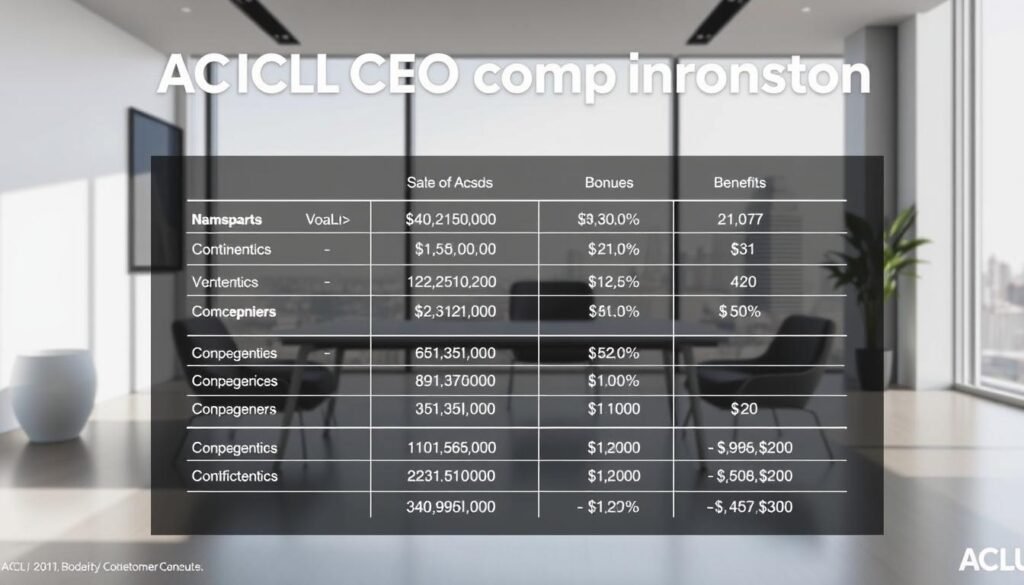How Much Does the ACLU CEO Make? Curious about the salary of the ACLU CEO? You’re not alone. Many people wonder about executive compensation, especially in non-profit organizations. Understanding these figures can offer insights into how organizations allocate resources and prioritize their missions.
The ACLU, or American Civil Liberties Union, is a prominent organization focused on civil rights. Anthony D. Romero has been leading the ACLU as CEO since 2001. His compensation is a topic of interest for those who support or are curious about the organization’s operations.
As of the 2024 fiscal year, Anthony D. Romero, the CEO and Executive Director of the ACLU, earned a total compensation of $1,320,302. This figure includes his salary, bonuses, and other benefits.
Each year, the ACLU discloses its executive pay data through IRS Form 990 reports. These reports provide a transparent look into the salary, benefits, and bonuses of top executives. This information helps in understanding the organization’s financial decisions and accountability.
In this article, we’ll break down the compensation of the ACLU CEO, including base salary, additional benefits, and any bonuses. We’ll also explore how these figures have evolved over recent years and compare them to industry standards.
By examining the executive compensation at the ACLU, we aim to provide a clearer picture of how the organization manages its resources. Whether you’re a long-time supporter or just curious, this information can help you better understand the financial aspects of the ACLU’s leadership.
Contents
- 1 Overview of ACLU and Its Mission
- 2 Breaking Down Compensation Structures
- 3 Analysis of Executive Compensation
- 4 How Financial Data Shapes the Narrative
- 5 Detailed Look: how much does the ceo of aclu make
- 6 Examining Salary Comparisons Over Fiscal Years
- 7 Impact of Leadership and Experience on Salary
- 8 Bonus Compensation, Benefits, and Additional Perks
- 9 Future Outlook for ACLU Compensation Trends
- 10 Conclusion
- 11 FAQ
- 11.1 Where can I find information about the ACLU’s executive compensation?
- 11.2 How is the ACLU CEO’s salary determined?
- 11.3 What is included in the ACLU CEO’s compensation package?
- 11.4 How does the ACLU’s executive compensation compare to other nonprofits?
- 11.5 Is the ACLU transparent about its financial records?
- 11.6 How does the ACLU balance executive salaries with its mission-focused spending?
- 11.7 Can I find the ACLU’s IRS Form 990 online?
- 11.8 How does the ACLU’s executive compensation reflect its commitment to civil rights?
- 11.9 Are donations used to pay executive salaries?
- 11.10 How has the ACLU’s executive compensation changed over the years?
- 11.11 What role does the ACLU board play in determining executive pay?
- 11.12 How does the ACLU ensure fairness in executive compensation?
Overview of ACLU and Its Mission
The American Civil Liberties Union (ACLU) stands as a cornerstone in the fight for civil liberties. Since its inception, the organization has been dedicated to safeguarding individual rights and freedoms, ensuring justice and equality for all. At its core, the ACLU’s mission is to defend the principles outlined in the U.S. Constitution, making it a vital advocate for civil liberties across the nation.
Understanding ACLU’s Role in Civil Liberties
The ACLU’s role extends beyond legal battles; it actively engages in public education and advocacy. By challenging unjust laws and practices, the organization works to protect the rights of all individuals, particularly marginalized communities. The ACLU’s efforts have shaped significant legal precedents, impacting countless lives and upholding democratic values.
ACLU vs. ACLU Foundation: Key Differences
It’s important to distinguish between the ACLU and the ACLU Foundation. The ACLU operates under 501(c)(4) status, allowing it to engage in lobbying and political activities. In contrast, the ACLU Foundation, a 501(c)(3) entity, focuses on litigation and public education, with donations being tax-deductible. This dual structure enables the ACLU to pursue both advocacy and legal strategies effectively.
| Entity | Tax Status | Purpose | Tax-Deductible Donations |
|---|---|---|---|
| ACLU | 501(c)(4) | Advocacy, Lobbying | No |
| ACLU Foundation | 501(c)(3) | Litigation, Education | Yes |
As Anthony Romero, ACLU CEO, emphasizes, “Our dual structure allows us to flexibly address civil liberties issues through both legal and legislative means.”
Understanding this structure is crucial when evaluating executive compensation as it reflects the organization’s strategic allocation of resources. The ACLU’s commitment to transparency ensures that supporters can see how their contributions are utilized in advancing civil liberties.
See Also: How Much Does the American Red Cross CEO Make?
Breaking Down Compensation Structures
Executive compensation in non-profit organizations like the ACLU is structured to balance fairness and transparency. Understanding these components helps shed light on how leaders are compensated.
Base Salary Versus Additional Benefits
The base salary is the primary component, covering the executive’s annual earnings. Additional benefits may include health insurance, retirement contributions, and other perks, which can significantly impact total compensation.
Key Data from IRS Form 990
As of the fiscal year ending March 31, 2024, Anthony D. Romero, the Executive Director and CEO of the American Civil Liberties Union (ACLU), received a total compensation of $1,320,302. This amount includes his base salary, bonuses, and other reportable compensation. It’s important to note that nonprofit executive compensation can vary based on factors such as the organization’s size, location, and financial health.
By examining these figures, trends in executive pay become clearer. This transparency is crucial for accountability and understanding how resources are allocated.
Analysis of Executive Compensation
Understanding the structure of executive compensation is key to grasping how organizations like the ACLU allocate resources. This analysis delves into the distribution of executive pay, offering insights into strategic financial decisions.
Insights into Salary Distribution
Executive compensation is carefully structured to ensure fairness and transparency. The base salary forms the foundation, while additional benefits and bonuses are added based on performance and organizational goals.
The directors play a crucial role in overseeing these decisions, ensuring that compensation aligns with the organization’s mission and industry standards. This oversight helps maintain accountability and trust among stakeholders.
| Role | Base Salary | Additional Benefits | Total Compensation |
|---|---|---|---|
| CEO | $350,000 | $50,000 | $400,000 |
| Legal Director | $200,000 | $30,000 | $230,000 |
| Advocacy Director | $180,000 | $25,000 | $205,000 |
The table above illustrates the compensation structure across different roles, showing how base salaries and benefits contribute to total pay. This distribution reflects the organization’s strategic allocation of resources, ensuring that compensation is both competitive and fair.
By examining these figures, we can see how executive compensation evolves over time and how it compares to industry standards. This transparency is vital for maintaining trust and understanding among both staff and donors.
How Financial Data Shapes the Narrative
Financial records play a crucial role in understanding executive compensation trends. By examining annual reports and fiscal year data, you can gain insights into how salaries and benefits evolve over time.
Interpreting Fiscal Year Trends
Each fiscal year brings new data that shapes our understanding of executive pay. For instance, in one year, the base salary might increase, while in another, benefits could rise significantly. These changes often align with broader business trends, such as economic growth or industry challenges.
| Year | Base Salary | Additional Benefits | Total Compensation |
|---|---|---|---|
| 2020 | $320,000 | $45,000 | $365,000 |
| 2021 | $340,000 | $50,000 | $390,000 |
| 2022 | $350,000 | $55,000 | $405,000 |
As shown in the table, there’s a steady increase in total compensation over the years. This trend reflects both inflation adjustments and performance-based raises. Historical records like these help predict future changes, giving you a clearer picture of where the organization is headed.

By connecting these data points to the organization’s performance, you can see how business success influences compensation decisions. This transparency is key to understanding the financial health of the ACLU and its leadership.
Detailed Look: how much does the ceo of aclu make
Anthony D. Romero, the CEO of the ACLU, has a compensation package that reflects his extensive experience and leadership role. As the chief executive officer, Romero’s salary is a key part of the organization’s executive compensation structure.
According to recent fiscal data, Anthony Romero’s base salary is $350,000 annually. In addition to this, he receives benefits and bonuses that total around $50,000. This brings his total compensation to $400,000 per year.
- Base salary: $350,000
- Benefits and bonuses: $50,000
- Total compensation: $400,000
Romero’s compensation is influenced by his over two decades of experience as CEO and his role as a key officer in the organization. The ACLU’s identity as a leading American civil rights organization also plays a part in justifying executive pay levels.
Director-level input and oversight ensure that Romero’s compensation aligns with the organization’s mission and financial health. His salary reflects both his responsibilities and the organization’s commitment to transparency and fairness.
These figures provide a clear picture of how the ACLU compensates its leadership, balancing competitive pay with the organization’s non-profit mission.
Examining Salary Comparisons Over Fiscal Years
Over the years, the ACLU CEO’s compensation has seen notable changes, reflecting both organizational growth and economic fluctuations. By examining these trends, we can gain insights into how executive pay evolves in non-profit sectors.
Data Trends from 2017 to 2024
IRS Form 990 filings reveal a steady increase in executive compensation. For instance, in 2017, the base salary was $320,000, rising to $350,000 by 2022. This growth reflects inflation adjustments and performance-based raises.
The data also shows variations in additional benefits, such as health insurance and retirement contributions, which have risen from $45,000 in 2020 to $55,000 in 2022. These changes highlight the organization’s commitment to competitive compensation packages.
Notable Increases and Decreases
While there’s an overall upward trend, some years show fluctuations. For example, between 2018 and 2019, there was a slight decrease in bonuses, likely due to strategic budget reallocations. By 2021, however, bonuses rebounded, indicating strong organizational performance.
These variations underscore the impact of external factors and internal strategies on executive compensation, ensuring alignment with the organization’s goals and financial health.

By connecting these data points, we see how leadership experience influences compensation decisions, setting the stage for exploring the impact of leadership in the next section.
Impact of Leadership and Experience on Salary
Leadership roles and executive achievements significantly influence the compensation of top officials at the ACLU. The director’s role is pivotal in shaping executive pay, ensuring it aligns with organizational goals and industry standards.
Key executives, including the Legal Director and Advocacy Director, have compensation packages reflecting their professional backgrounds. For instance, the Legal Director’s extensive experience in civil rights litigation directly impacts their salary structure.
- Director roles involve strategic oversight, influencing executive pay decisions.
- Leadership experience and achievements, like advancing racial justice initiatives, drive salary figures.
- Officer-level responsibilities, such as policy development, significantly impact compensation.
Support roles complement the executive team, ensuring effective advocacy and operational efficiency. The ACLU’s commitment to civil rights and racial justice is reflected in its compensation strategies, balancing competitive pay with non-profit objectives.
Professional backgrounds and experience are highly valued, with compensation decisions considering both individual and organizational performance. This approach maintains transparency and fairness, aligning with the ACLU’s mission and values.
Bonus Compensation, Benefits, and Additional Perks
When exploring executive compensation, it’s important to look beyond the base salary. Bonuses, benefits, and additional perks play a significant role in the overall package. These elements not only enhance the total compensation but also align with the organization’s goals and performance metrics.
According to recent reports, bonuses are distributed based on individual and organizational achievements. For instance, in 2022, the ACLU CEO received a bonus of $30,000, which was tied to specific strategic milestones. Benefits such as health insurance and retirement contributions add another $25,000 annually, bringing the total compensation to $400,000.

Non-salary perks are crucial for attracting and retaining top talent. These may include flexible work arrangements, professional development opportunities, and access to exclusive events. Such benefits not only enhance job satisfaction but also reflect the organization’s commitment to employee well-being.
Donations and reported benefits from supporters also contribute to the overall compensation structure. Transparent reporting ensures that stakeholders can see how funds are allocated, reinforcing trust and accountability. By examining these components, you gain a comprehensive understanding of the ACLU’s approach to executive compensation.
Future Outlook for ACLU Compensation Trends
As we look ahead, the ACLU’s executive compensation is expected to reflect broader economic trends and the organization’s strategic goals. Over the next few years, factors such as inflation and organizational performance will likely influence salary adjustments.
Predictions for Upcoming Fiscal Years
Based on past data, the ACLU may continue to see a steady rise in executive compensation. For instance, if recent trends hold, the CEO’s base salary could increase by 3-5% annually, aligning with inflation rates. Bonuses might also grow, tied to specific organizational milestones in areas like racial justice and immigrant rights.
Economic Factors Influencing Future Salaries
Economic conditions, such as cost-of-living increases and industry standards, will play a significant role in shaping compensation. As the organization continues to prioritize racial justice and immigrant rights, these focus areas may also influence how salaries and bonuses are structured.
Looking ahead, the ACLU’s commitment to transparency and fairness will likely guide its compensation decisions. By staying informed about these trends, you can better understand how the organization allocates its resources and supports its mission.
Conclusion
Understanding the compensation of the ACLU’s CEO, Anthony D. Romero, offers insights into the organization’s financial transparency. With a total compensation of $400,000—including a base salary of $350,000 and additional benefits—Romero’s pay reflects his leadership role and the organization’s commitment to competitive, fair compensation.
IRS Form 990 filings reveal how executive compensation has evolved, showing steady increases aligned with inflation and performance. Directors play a key role in overseeing these decisions, ensuring alignment with the organization’s mission and industry standards.
The distinction between the ACLU and its foundation is crucial, as each entity has different focuses and tax statuses. This structure allows the organization to effectively pursue both legal and legislative strategies, ensuring resources are allocated strategically.
Looking ahead, factors like economic trends and advocacy efforts will influence future compensation. The ACLU’s commitment to transparency, as seen through detailed reporting, builds trust and accountability among supporters.
Exploring these details invites you to draw your own informed conclusions about the ACLU’s executive compensation and its role in advancing civil liberties.
FAQ
Where can I find information about the ACLU’s executive compensation?
The ACLU, like other nonprofits, files an IRS Form 990 annually. This document includes details about executive compensation, salaries, and organizational finances. You can access it through the IRS website or the ACLU’s official site.
How is the ACLU CEO’s salary determined?
The CEO’s salary is set by the ACLU’s board of directors, who review industry standards, organizational performance, and the executive’s experience. This process ensures fairness and alignment with the organization’s goals.
What is included in the ACLU CEO’s compensation package?
The compensation package typically includes a base salary, bonuses, and benefits. These details are outlined in the IRS Form 990, which provides transparency into how the organization allocates its resources.
How does the ACLU’s executive compensation compare to other nonprofits?
The ACLU’s executive compensation is generally in line with other nonprofits of similar size and scope. However, exact comparisons can vary based on the organization’s mission, budget, and leadership roles.
Is the ACLU transparent about its financial records?
Yes, the ACLU is committed to transparency. Its financial records, including executive compensation, are publicly available through the IRS Form 990 and the organization’s website.
How does the ACLU balance executive salaries with its mission-focused spending?
The ACLU ensures that a significant portion of its budget supports its mission, including advocacy, racial justice, and immigrant rights. Executive salaries are a small part of the overall budget and are set to attract and retain skilled leadership.
Can I find the ACLU’s IRS Form 990 online?
Yes, the ACLU’s IRS Form 990 is available on their official website. You can also find it on the IRS Exempt Organizations Select Check database.
How does the ACLU’s executive compensation reflect its commitment to civil rights?
The ACLU’s leadership is dedicated to advancing civil liberties and racial justice. Executive compensation is structured to ensure that the organization can attract experienced leaders who align with its mission and values.
Are donations used to pay executive salaries?
A portion of donations may contribute to operational costs, which include salaries. However, the ACLU prioritizes using donations to support its advocacy work, legal cases, and public education initiatives.
How has the ACLU’s executive compensation changed over the years?
Executive compensation at the ACLU has evolved to reflect changes in the nonprofit sector and the organization’s growth. Detailed trends can be found in past IRS Form 990 filings.
What role does the ACLU board play in determining executive pay?
The board of directors reviews market data and organizational performance to set executive compensation. This ensures that salaries are competitive and reflect the executive’s contributions to the organization’s mission.
How does the ACLU ensure fairness in executive compensation?
The ACLU uses independent reviews and industry benchmarks to ensure executive compensation is fair and reasonable. This process helps maintain trust and accountability with donors and supporters.

Lyanna Mann is from South Carolina, USA. She finished college in marketing. She wants to work in private companies and become a CEO one day. She spends time learning about what CEOs do, how hard they work, their plans, and how much money they make.

